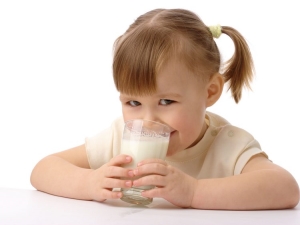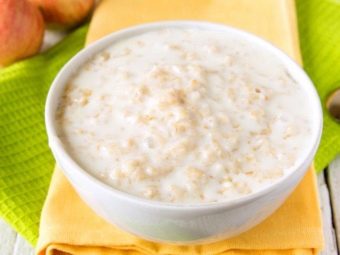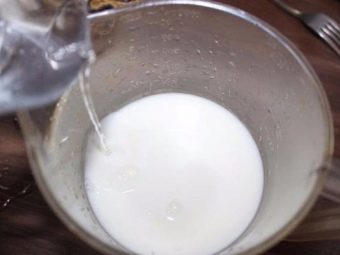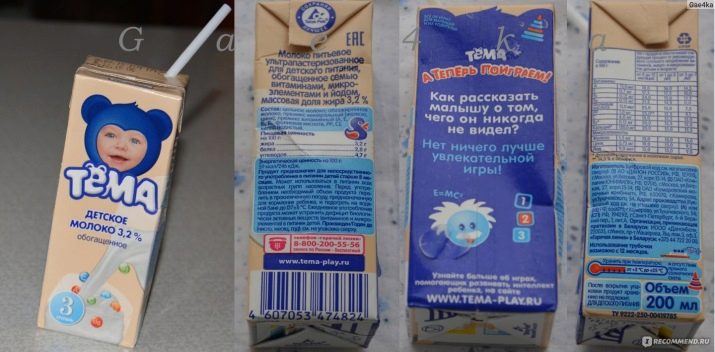From what age and how to introduce cow's milk into the child's diet?

Disputes about the feasibility of introducing cow's milk into the diet of a newborn baby have been going on for a very long time, especially considering the fact that many great-grandmothers and grandmothers fed their babies without problems with this drink.
Unfortunately, in ancient times, the development of medical science was not as serious as it is now. Therefore, doctors, and even mothers, did not know the causes of many diseases in babies. Today, numerous studies conducted in the field of infant feeding, suggest that cow's milk should be included in the diet of the child with caution.
Is it possible and why give milk to infants?
Despite the fact that the process of introducing milk into the diet of young children must be approached with extreme caution (as with everything new that a baby is trying), This product contains important components that have useful properties.
- Squirrels. Their structure includes 8 irreplaceable amino acids. The human body cannot work out such substances on its own.
- Fat There are polyunsaturated fatty acids, which are necessary for the natural development of the nervous system. There are also other compounds similar to fats. They are needed to regulate metabolic processes in the body.
- Carbohydrates. They act as the main source of energy for a growing organism.
- Vitamins and trace elements. Provide the normal growth of the child.
Therefore, milk is not only possible, but also should be introduced into the baby’s diet, but this should be done only after 12 months of age.
When should I refuse?
You should not give cow's milk to babies who have not turned a year. There are certain reasons for refusing milk at such a young age.
- The digestive tract of the baby is not so developed as to be able to fully digest cow's milk, like breast or special mixture. The proportion of casein in dairy products is so high that an immature tummy is not able to fully digest it, as a result of which it can form a large clot, which is characterized by an increased density.
- In addition, there is a high content of minerals in cow's milk, which exerts an unreasonable load on the immature urinary system of the child. Trying to recycle a large number of microelements, the baby’s kidneys are constantly overstressed.
- If the baby, who has not yet turned a year, will consume milk in large quantities, this may provoke the development of iron deficiency anemia, since dairy products impede the process of proper iron absorption. This element cannot be reduced or removed from the diet of such a young creature.
- By irritating the mucous membrane of the intestines and other organs of the digestive system, milk can cause blood impregnation in the feces, as well as provoke internal bleeding.
- There is also an excess of sodium contained in cow's milk. It is there 3 times more than the mother. This can cause the development of allergies in the baby.
- The risk group includes tots, in which the family has diabetes patients, since the use of dairy products can provoke the development of this disease at a very young age.
There are also contraindications for the start of feeding with dairy products, if a baby has certain diseases.
- Tendency to allergic reactions. Casein, which is part of cow's milk, cannot be completely digested by the insufficiently developed karapuz digestive system, so it penetrates the bloodstream and causes an allergic reaction.
- The presence of a baby lactase enzyme deficiency - insufficient amount of the enzyme, which is designed to digest milk sugar. This type of illness may have varying degrees of severity.In some cases, there is complete intolerance to milk. If after taking a special preparation, which contains lactase, no improvement is observed, the baby is recommended to use either lactose-free or low-lactose mixtures, and not cow's milk.
- The baby has metabolic problems or difficulty digesting food. Such babies can eat this product only after obtaining permission from the gastroenterologist or pediatrician.
- It is very dangerous for a kid to drink dairy products, if there are problems with the assimilation of galactose. This substance is formed when milk sugar is broken down.
- The presence of congenital fermentopathy is a ban on the use of dairy products, while the baby from birth must follow a milk-free diet. This ailment is detected in the maternity hospital during the screening study.
The optimal age of complementary foods
A suitable period when you can start feeding your baby with cow's milk is considered to be the age after 1 year. However, if the baby is not breastfed, but uses adapted mixtures, you can begin feeding this product from 9 to 12 months.
It is important to remember that this process should occur gradually. It is better to start giving the baby not just milk, but milk porridge made from it. By and large, it does not matter what kind of porridge it will be: buckwheat, oatmeal, rice, corn or some other. Most importantly, the baby liked her.
It is also worth limiting the amount of milk consumed by a child whose age is between 1 and 3 years. The maximum amount of drunk milk product should not exceed 2-3 glasses per day.
Should I breed?
Many pediatricians recommend breeding cow's milk, especially if it is assumed that this product will be consumed by the infant. With this, you can reduce the fat content of milk, so that the baby will be easier and easier to digest.
Starting lure, It is recommended to dilute milk in a ratio of 3 or 2 to 1, that is, in 100 ml of milk it is necessary to add 200 or 300 ml of water. It is recommended to dilute it with pre-boiled water. Milk must also be boiled for a few minutes.
After 1-2 weeks, the concentration of milk can be increased, for example, 100 ml of milk can be taken up by 100 ml of milk. It is worth doing only if the baby perfectly digests this product.
Dietary administration rules
Milk should be introduced into the infant's diet very carefully, starting with 1 teaspoon.
At the same time, it is necessary to closely monitor the reaction of the baby. If the child becomes restless, he has a rash, there is reddening of the skin, itching or a violation of the chair, the use of this drink should be immediately stopped.
In the event of an allergic reaction, you should immediately consult with a pediatrician who has a baby, or seek help from an allergist.
There are several rules that must be followed in the process of introducing such a drink into the diet of the infant.
- It is better to give milk in the morning. So you will have more time to evaluate the possible reaction of the child to the new product. If you give your baby milk for the first time in the evening, then a possible allergic reaction may occur at night, which is extremely dangerous in the event of an increased temperature.
- Enter only one milk. You should not give any other new product on this day, because in this case you will not know what product your baby is allergic to.
- If you use milk for making milk porridge, then dilute it with warm boiled water to reduce the fat content of the product.
- A gradual increase in the amount of milk consumed should be only if the baby tolerates it perfectly.Such a drink is not recommended to be abused, replacing with it only 1 feeding. In other cases, the baby should use either breast milk or adapted milk formula.
Choosing the right product
If you prefer to give your baby cow's milk, purchased on the market, then ask about the conditions in which the animal is, what it is fed, because it will depend on whether harmful substances get into the milk or not. It is better to give preference to "proven" cows, the quality of milk that you have no doubt.
When buying a dairy product for a baby, be sure to pay attention to how it was processed.
- Pasteurization. Milk is heated to a temperature of 70–80 degrees and is in this state for a short period of time. In this case, there is a greater amount of nutrients in it, but at the same time, spores of pathogens can remain in such a drink. Such a product can be stored for no more than 5–6 days, and it must be boiled before use.
- Sterilization. The milk is heated to a temperature of 135–138 degrees, and then cooled. This ensures the removal of possible pathogenic bacteria. Such a product can be drunk without boiling.
The best option for feeding and introduction to the diet is a special baby milk, which can be purchased in almost any store or supermarket. It is adapted and made specifically for children's audiences. Its quality is monitored by special bodies.
In addition, this product is enriched with special vitamins and nutrients that ensure the full growth and development of the baby.
When choosing a dairy product for a peanut, it is necessary to take into account several important aspects.
- Manufacturer. It is better to give preference to a proven manufacturer who cares about the quality of their products.
- Shelf life. The best option is to store such a product for no more than 10 days. In no case is it recommended to give the baby milk, the shelf life of which has long expired, because you can provoke serious food poisoning.
- The mark of age. If the packaging indicates that this product can be given to children from 3 years, then it is better not to risk and pick up a dairy product for a younger age.
- Fat This figure should not exceed 3.2% if the milk drink is used for complementary feeding. In addition, it is not recommended to give babies completely skimmed milk. If the fat content of cow's milk exceeds 3%, then it is better not to use the child until his age reaches 4-5 years.
After you have opened the packaging of milk, you should follow the rules for its storage, which are indicated on the label.
Pediatrician recommendations
If your baby has had a rotavirus infection, then it should not be given dairy products. The ban extends for 2-3 weeks after the complete recovery of the toddler. Pediatricians recommend a similar restriction due to the fact that rotavirus infection has a negative impact on the process of lactose enzyme production, blocking it. And without this enzyme, the baby will not be able to break down milk sugar - lactase. Therefore, to avoid indigestion, pain in the abdomen, and stool disorders (in the form of constipation or diarrhea), after a rotavirus infection, do not use not only the cow, but also mother's milk.
Doctors recommend boil milk before giving it to the baby. This is especially true of products that have been purchased on the market. In the process of boiling killed bacteria and microorganisms that may be contained in this drink. At the same time, the effect of high temperature does not negatively affect the content of useful substances (such as proteins, fats, carbohydrates, calcium and phosphorus) in a similar product.
Therefore, despite the fact whether you have doubts or they are absent as to the quality of the dairy product, you should still boil it before giving it to the baby.
As you can see, it is necessary to start feeding the cow milk very carefully, adhering to the basic rules and recommendations. And then a similar drink, of course, will benefit your baby. On the effect of cow's milk on the body of a child, Dr. Komarovsky tells in the video below.





































